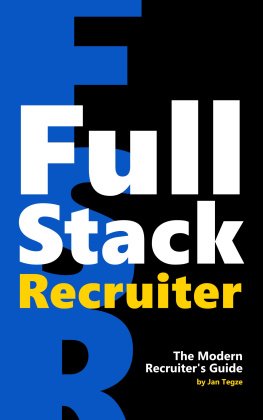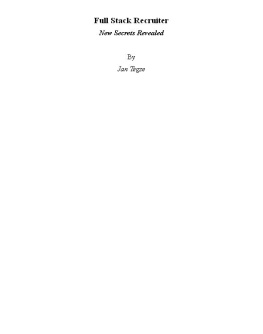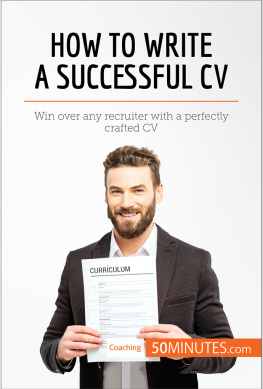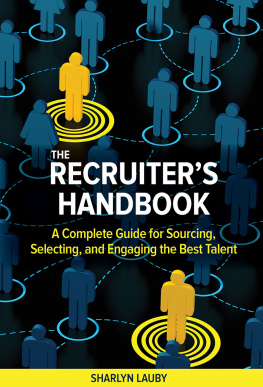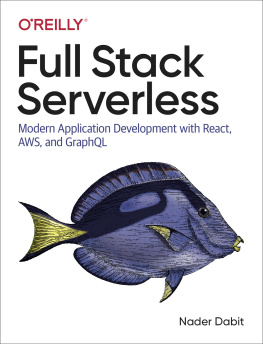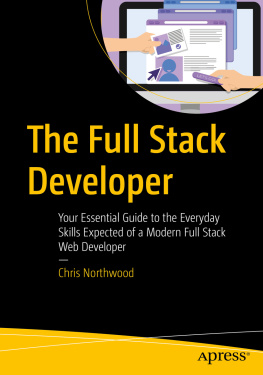Tegze - Full Stack Recruiter : The Modern Recruiters Guide
Here you can read online Tegze - Full Stack Recruiter : The Modern Recruiters Guide full text of the book (entire story) in english for free. Download pdf and epub, get meaning, cover and reviews about this ebook. year: 2017, publisher: Lightning Source Inc, genre: Home and family. Description of the work, (preface) as well as reviews are available. Best literature library LitArk.com created for fans of good reading and offers a wide selection of genres:
Romance novel
Science fiction
Adventure
Detective
Science
History
Home and family
Prose
Art
Politics
Computer
Non-fiction
Religion
Business
Children
Humor
Choose a favorite category and find really read worthwhile books. Enjoy immersion in the world of imagination, feel the emotions of the characters or learn something new for yourself, make an fascinating discovery.
- Book:Full Stack Recruiter : The Modern Recruiters Guide
- Author:
- Publisher:Lightning Source Inc
- Genre:
- Year:2017
- Rating:5 / 5
- Favourites:Add to favourites
- Your mark:
- 100
- 1
- 2
- 3
- 4
- 5
Full Stack Recruiter : The Modern Recruiters Guide: summary, description and annotation
We offer to read an annotation, description, summary or preface (depends on what the author of the book "Full Stack Recruiter : The Modern Recruiters Guide" wrote himself). If you haven't found the necessary information about the book — write in the comments, we will try to find it.
Tegze: author's other books
Who wrote Full Stack Recruiter : The Modern Recruiters Guide? Find out the surname, the name of the author of the book and a list of all author's works by series.
Full Stack Recruiter : The Modern Recruiters Guide — read online for free the complete book (whole text) full work
Below is the text of the book, divided by pages. System saving the place of the last page read, allows you to conveniently read the book "Full Stack Recruiter : The Modern Recruiters Guide" online for free, without having to search again every time where you left off. Put a bookmark, and you can go to the page where you finished reading at any time.
Font size:
Interval:
Bookmark:

Full Stack Recruiter
The Modern Recruiter's Guide
By
Jan Tegze
First Published In 2017 by Jan Tegze. Copyright 2017 Jan Tegze
Book design by Tom Zeman
ISBN 978-80-270-2615-9
All rights reserved. No part of this publication may be reproduced, stored in or introduced into a retrieval system, or transmitted, in any form, or by any means (electronic, mechanical, recording, photocopying recording or otherwise) without the prior written permission of the author, except in the case of brief quotations embodied in critical reviews and certain other noncommercial uses permitted by copyright law.
The book is sold subject to the condition that it shall not, by way of trade or otherwise, be lent, resold, hired out, or otherwise circulated without the publisher's prior consent in any form of binding or cover other than that in which it is published and without a similar condition including this condition being imposed on the subsequent purchaser.
DISCLAIMER AND TERMS OF USE AGREEMENT
This book is published for informational purposes only. The publisher and or the author make no representations or warranties with respect to the accuracy or completeness of the contents of this work and specifically disclaim all warranties, including without limitation warranties of fitness for a particular purpose. No warranty may be created or extended by sales or promotional materials. The advice and strategies contained herein may not be suitable for every situation. The information contained in this book is not and is not intended to be advice of any kind. Publication of this book does not create a consultant-client relationship.
When you access this book or e-book, you agree that the author and or publisher of this book, shall not be liable to you for any loss or injury caused by procuring, compiling or delivering the information gained from the book. In no event will the author and or publisher of the book, be liable to anyone for any action taken on the basis of such information or for any incidental, consequential, special or similar damages. The author and or publisher of this book, expressly disclaims any and all liability for any direct, indirect, incidental, consequential or special damages arising out of any and or buying and reading of this book and/or any information contained on this book. The author and or publisher of the book disclaims all responsibility for any loss, injury, claim, liability or damage of any kind resulting from, arising out of, or any way related to any information and content of this book. The information contained in this eBook is strictly for educational purposes. Therefore, if you wish to apply the ideas in this Book or eBook, you are taking full responsibility for your actions.
Every attempt has been made by the author to provide acknowledgment of the sources used for the material in this book. While the author has made every effort to provide accurate Internet addresses and authors of sourcing methods at the time of publication, neither the publisher nor the author assumes any responsibility for errors and omissions, or for changes that occur after publication. Technology and services are constantly changing and therefore might contain errors and/ or information that, while accurate when it was written, may be no longer accurate by the time you read it. Your use of or reliance on the information in this book is at your own risk and the author and or publisher are not liable or responsible for any resulting damage or expense.
Every possible effort has been made to ensure that the information contained in this book is accurate at the time of going to press, and the publishers and author cannot accept responsibility for any errors or omissions.
CONTENTS
There's an old African proverb that says, If you want to go quickly, go alone. If you want to go far, go together.
Writing this book would not have been possible without the support of those that joined me on my journey to becoming a published author. I would like to thank everyone for their help, assistance, and patience, especially: Mark Tortorici, Justin Clem, Sarah E. Goldberg, Gabriela Benkov, Aaron Pullman, Maisha L. Cannon, Aneka Mller, and Oldich Tegze.
(R)evolution in Recruitment
Everything starts somewhere. And because knowledge of the past is key to understanding the present, let's begin with a brief history of recruitment.
Many people think that recruitment is a relatively new field, and that the recruiter's position is quite a new job role on the market. But recruitment is not such a modern industry. In fact, the first recruitment activities and techniques originated in ancient Egyptian and Roman times. Information about the first "recruiters" began around 55 BC, when the first referral program was born.
Julius Caesar offered three hundred sestertii to any soldier who recruited someone into the Roman army. The payment represented 30% of a soldier's yearly salary; it reflected how serious the Romans were about finding soldiers. Caesar probably created the first referral program in the world, and soldiers became the first recruiters.
One of the oldest references to a public employment agency is from the year 1650. Henry Robinson proposed an "Office of Addresses and Encounters." Its goal would be to link employers with workers. His proposal was rejected by the British Parliament, but nevertheless, he opened a short-lived private recruiting business.
Military activities continued to play a role in recruitment. One of the earliest recruitment posters was for the Confederate States of America: "To Arms! To Arms!"
WW2 Era
The "modern" recruitment field started in the 1940s as a result of World War II. After the army recruited men to fight abroad, their jobs at home needed to be filled, so the first employment agencies were established to recruit people to fill these open vacancies. After World War II, the main job of these recruitment agencies was to help veterans find jobs, so resume-writing became one of the standard practice of recruiters.
Pre-Computer Era
When the US economy started growing, the role of recruiters evolved, and they started helping companies find the right people, as the companies started to outsource their recruitment activities to agencies.
Active candidates were often found jobs via bulletin boards, and in local or national newspapers, where job offerings and adverts were posted by companies and agencies. Personal recommendation and word-of-mouth referrals were also featured. Passive candidates were found through databases, which were full of paper resumes in physical archives.
The most advanced tool that recruiters had in that era was the landline telephone. Interviews were mostly face-to-face meetings in offices or restaurants. Due to the difficulty of job searches then, most candidates spent their whole careers working for one single company.
Pre-Web Era
Then computers started playing a bigger role in the hiring process. When the first new application of tracking systems started to emerge, companies could electronically track and organize candidates. For recruiters, the distribution channels were almost the same as in the pre-computer era.
World Wide Web Era
When the internet started to become popular, candidates could search for jobs online. Access to the internet was limited during that time, but companies slowly started to publish online career pages, and many new job boards appeared on the internet. CareerBuilder was founded in 1995; it was the first major online job board.
If you like learning this history, you can visit Wayback Machine (www.archive.org) and see what the first version of careerbuilder.com looked like.
Font size:
Interval:
Bookmark:
Similar books «Full Stack Recruiter : The Modern Recruiters Guide»
Look at similar books to Full Stack Recruiter : The Modern Recruiters Guide. We have selected literature similar in name and meaning in the hope of providing readers with more options to find new, interesting, not yet read works.
Discussion, reviews of the book Full Stack Recruiter : The Modern Recruiters Guide and just readers' own opinions. Leave your comments, write what you think about the work, its meaning or the main characters. Specify what exactly you liked and what you didn't like, and why you think so.

